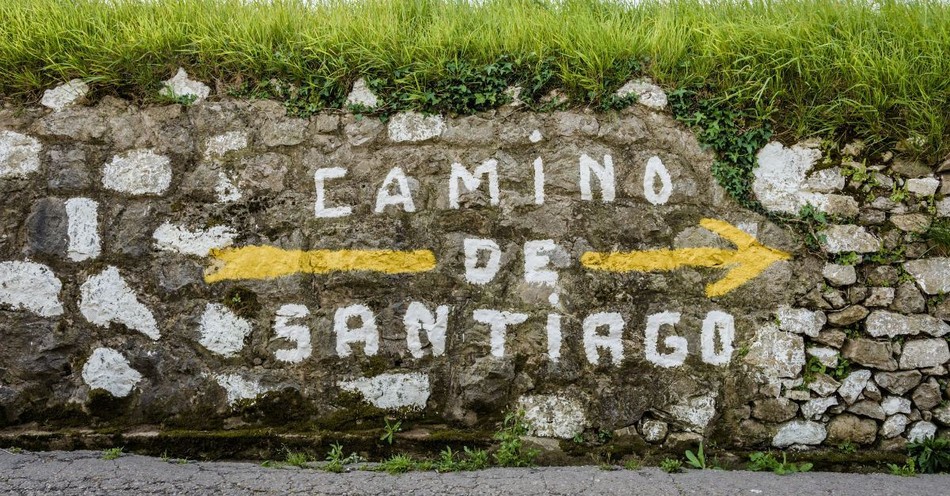Saint James the Greater was one of the twelve apostles of Jesus and the brother of St. John the Evangelist (Mark 1:19-20). James and John, along with the Apostle Peter, were part of Jesus’ “inner circle,” witnessing key events that the other apostles did not witness (Mark 5:35-43; Matthew 17:1-8, 26:36-46).
After James was martyred, legend places his remains in Spain, where they are supposedly enshrined in a cathedral known as the Cathedral of Santiago de Compostela.
Since the Middle Ages, people have walked from certain starting points across Europe to his tomb along pilgrimage routes that have become known as the Way of St. James.
Who was St. James the Greater?
James the Greater was the son of Zebedee and Salome and the brother of John the Evangelist. Scripture recounts that after calling Simon Peter and Andrew to be his first disciples, Jesus then called James and his brother John to follow Him (Mark 1:16-20). Upon being summoned by Jesus, the brothers immediately left everything behind to follow Christ (Mark 1:20).
James and John were believed to have fiery tempers. In fact, Jesus nicknamed them the “sons of thunder” (Mark 3:17) perhaps because of the zealous temperament the brothers showed in wanting to destroy a Samaritan village that had refused to show Jesus hospitality (Luke 9:51-56); or because of their brazen request to be seated on the right and left of Jesus in heaven (Mark 10:35-40).
The Apostle James the Greater is not to be confused with the other Apostle James, referred to as James the Lesser. To distinguish between the two, it’s believed that James the Greater was given his title simply because he was either taller or older than James the Lesser.
Some believe that James the Greater was Jesus’ cousin, noting that there is evidence in Scripture of their mothers being sisters (Matthew 27:55-56; Mark 15:40-42; John 19:25). Whether Jesus and James were related or not, James —along with his brother John and the Apostle Peter—were Jesus’ three most trusted disciples. As part of Jesus’ “inner circle,” these three apostles were allowed to know His identity and power more extensively than the other disciples.
In particular, Jesus gave James the Greater, John, and Peter the privilege of witnessing three key moments in His ministry:
- The raising of Jairus’ recently deceased daughter (Mark 5:35-43),
- The transfiguration of Jesus (Matthew 17:1-8), and
- Jesus’ agony in the garden of Gethsemane (Matthew 26:36-46).
The Death of James the Greater and the Legend of His Remains
James the Greater was the first apostle to be martyred and the only apostle aside from Judas Iscariot whose death is recorded in the Bible (Acts 12:1-2). Scholars believe that King Herod Agrippa ordered the beheading of James in 44 A.D. in Jerusalem.
The Bible is silent as to the resting place of James’ remains. However, a medieval legend holds that James the Greater had preached in Spain during his lifetime and that, after his death, his remains were transported to Spain for burial. In the ninth century, the tomb of St. James (known as Santiago in Spanish) was believed to have been rediscovered in Spain. Those remains were later enshrined in the Cathedral of Santiago de Compostela in Galicia (northwestern), Spain, where they remain today.
The Way of St. James: One of the Oldest and Most Prominent Pilgrimages
Over the centuries, a network of pilgrimage routes emerged upon which Europeans walked from their homes to the shrine of St. James in Spain. These thousand-year-old pilgrimage routes became known as the Way of St. James (or, the Camino de Santiago in Spanish).
Although the Way of St. James has many starting points today, the most popular starting point in recent years has been Saint Jean Pied de Port in southwestern France. From this starting point, called the French Way, the pilgrimage route is 500 miles long to the shrine of St. James in northwestern Spain. This route, if walked entirely, takes “pilgrims” (or peregrinos)at least 35 days to complete. Although most pilgrims embark upon the Way of St. James on foot, some choose to complete sections of the pilgrimage on bicycle or horseback.
During the journey, travelers are given a “Pilgrim’s Passport,” which they get stamped at designated areas along the routes as evidence that they’ve completed certain portions of the trip. Travelers also have access along the Way to structures built over the centuries to accommodate their needs, including hotels, hostels, hospitals, churches, monasteries, and bridges.
The pilgrimage ends upon arrival at the Cathedral of Santiago de Compostela. Inside this ancient Cathedral, the pilgrims can obtain a certificate of accomplishment known as a Compostela, visit the supposed tomb of St. James the Greater, and attend a Pilgrim’s Mass.
In recent years, hundreds of thousands of Christians and non-Christians have walked the Way of St. James alone or in organized groups, for religious or non-religious reasons. The Way of St. James has been recognized as one of the most prominent Christian pilgrimage sites in history, comparable in importance to Jerusalem and Rome. In 1993, UNESCO designated the Way of St. James pilgrimage routes as a World Heritage Site.
For more information on the Way of St. James pilgrimage, visit the Cathedral of Santiago de Compostela’s website. For a family-friendly, PG-13 movie filmed on location along the Way of St. James and starring Martin Sheen, check out The Way (2011).
Sources:
Biblestudytools.com, New International Version.
Britannica.com, “Saint James Apostle, Son of Zebedee, The Editors of Encyclopaedia Britannica.
Catedraldesantiago.es, “Pilgrimage.”
Cbn.com, “Emilio Estevez and Martin Sheen on Faith and Filming The Way,” Hannah Goodwyn.
Economist.com, “What do James, Yakov and Santiago have in common?,” Sept. 27, 2010.
NCRonline.com, “On this day: St. James the Greater,” July 25, 2011, Gerelyn Hollingsworth.
Verywellfit.com, “Planning for Your Camino de Santiago Walk,” April 23, 2019, Wendy Bumgardner.
Whc.unesco.org, “Routes of Santiago de Compostela: Camino Frances and Routes of Northern Spain.
Dolores Smyth is a faith and parenting writer whose work has appeared in numerous print and online publications. You can read more of her work on Twitter @LolaWordSmyth.
Photo Credit: GettyImages/Martin Schtz



